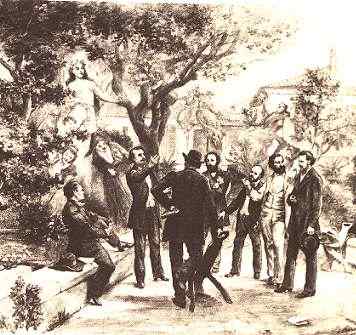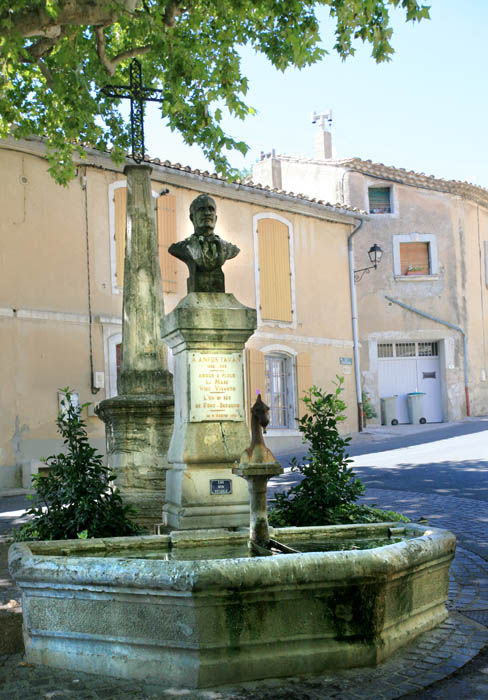|
Château De Font-Ségugne
The Château de Font-Ségugne is a historic château built at Font-Ségugne in Châteauneuf-de-Gadagne, Provence, France. It is the location of a former bastide built in the 15th century for a Roman Catholic cardinal. It was the birthplace of the ''Félibrige'' in the 1850s. Nowadays, it is a winery. Location It is located on the Cancabèu (Campbeau) plateau in Châteauneuf-de-Gadagne, Provence, Southern France. History 15th-century house In the 15th century, a bastide was built for an Italian Roman Catholic cardinal.Maurice Pezet, ''Le Ventoux et le comtat venaissin'', Fernand Lanore, Paris, 1977, p. 2/ref> It later belonged to the Dukes of Gadagne.Cinquantenaire de Font-Ségugne |
Alphonse Tavan
Alphonse Tavan (9 March 1833 – 12 May 1905) was a French Provençal poet. Early life Tavan was born in 1833 in Châteauneuf-de-Gadagne. He published a collection of romantic poems in Provençal, ''Amour e plour'', in 1876. He attended the fiftieth anniversary of the Félibrige on 22 May 1904 with Mistral; all the other co-founders had died. Death He died in 1905 in his hometown of Châteauneuf-de-Gadagne. Legacy His bust adorns a fountain in Châteauneuf-de-Gadagne. The ''Collège Alphonse Tavan'', a secondary school in Avignon, is named in his honour. References 1833 births 1905 deaths 19th-century French poets French male poets People from Vaucluse 20th-century French poets 19th-century French male writers 20th-century French male writers {{France-poet-stub ... [...More Info...] [...Related Items...] OR: [Wikipedia] [Google] [Baidu] |
Anselme Mathieu
Anselme Mathieu (21 April 1828 – 8 February 1895) was a French Provençal poet. Early life Anselme Mathieu was born 21 April 1828 in Châteauneuf-du-Pape. His parents were the fourth-generation owners of the Domaine Mathieu, a vineyard still in operation today.Châteauneuf-du-Pape: Domaine Mathieu Poetry Mathieu was a Provençal poet. He published poems in '' Armana prouvençau'' under the pseudonym of Félibre di Poutoun. On 21 May 1854, he co-founded the movement with |
Jean Brunet
Jean Brunet (27 December 1822 – 23 October 1894) was a French Provençal poet. Early life Brunet was born on 27 December 1822 in Avignon, in Provence, France.Charles Pierre Julian, ''Anthologie du Félibrige provençal (1850 à nos jours) poésie : Les fondateurs du Félibrige et les premiers Félibres'', Paris: Librairie Delagrave, 1920, pp. 208-21/ref> Career On 21 May 1854, he co-founded the Félibrige movement with Joseph Roumanille, Frédéric Mistral, Théodore Aubanel, Alphonse Tavan, Paul Giéra and Anselme Mathieu. He published collections of poems and sayings in Provençal. His first poems were published in the French literary journal entitled ''Musée des familles ''Musée des familles'' (''"Museum of Families"'') was an illustrated French literary magazine that was published in Paris from 1833 to 1900. It was founded by Émile de Girardin. Contributors of the magazine included Alexandre Dumas, Théophil ...'' in 1867. Personal life He was married to C� ... [...More Info...] [...Related Items...] OR: [Wikipedia] [Google] [Baidu] |
Théodore Aubanel
Théodore Aubanel (Occitan:''Teodòr Aubanèu''; 26 March 1829 – 2 November 1886) was a Provençal poet. He was born in Avignon in a family of printers. Aubanel started writing poetry in French but quickly switched to Provençal, due to the influence of Joseph Roumanille. He is known primarily for ''La Miougrano entreduberto'' (1860, ''The Split Pomegranate'') and ''Li Fiho d'Avignoun'' (1885, ''The Young Ladies of Avignon''), two collections of lyric poems. He died in Avignon. See also * Provençal literature References *Jean Albert Bédé and William Benbow Edgerton''The Columbia Dictionary of Modern European Literature.''Columbia University Press Columbia University Press is a university press based in New York City, and affiliated with Columbia University. It is currently directed by Jennifer Crewe (2014–present) and publishes titles in the humanities and sciences, including the fiel ..., 1980. ; p. 36 External links Life of Aubanel on Notreprovence.fr ... [...More Info...] [...Related Items...] OR: [Wikipedia] [Google] [Baidu] |
Joseph Roumanille
Joseph Roumanille (; 8 August 1818 – 24 May 1891) was a Provençal poet. He was born at Saint-Rémy-de-Provence (Bouches-du-Rhône), and is commonly known in southern France as the father of the Félibrige, for he first conceived the idea of raising his regional language to the dignity of a literary language. Biography Joseph Roumanille was the son of Jean-Denis Roumanille and Pierrette Piquet. He studied at the nearby ''collège'' (junior highschool) of Tarascon (Bouches-du-Rhône) from 1834. After working as ''clerc de notaire'' in the same town from 1836 to 1839, Roumanille published his first verses in the '' Écho du Rhône''. He then worked as a teacher in Nyons (Drôme), and later at the Dupuy ''collège'' in Avignon. When Roumanille was a teacher at Avignon, he discovered the genius of Frédéric Mistral, one of his pupils, and together they began what later became the Félibrean movement. He married Rose-Anaïs Gras, sister of Provençal poet and novelist Félix Gr ... [...More Info...] [...Related Items...] OR: [Wikipedia] [Google] [Baidu] |
Frédéric Mistral
Joseph Étienne Frédéric Mistral (; oc, Josèp Estève Frederic Mistral, 8 September 1830 – 25 March 1914) was a French writer of Occitan literature and lexicographer of the Provençal form of the language. He received the 1904 Nobel Prize in Literature "in recognition of the fresh originality and true inspiration of his poetic production, which faithfully reflects the natural scenery and native spirit of his people, and, in addition, his significant work as a Provençal philologist". Mistral was a founding member of the Félibrige and member of the Académie de Marseille. His name in his native language was Frederi Mistral (Mistrau) according to the Mistralian orthography or Frederic Mistral (or Mistrau) according to the classical orthography. Mistral's fame was owing in part to Alphonse de Lamartine who sang his praises in the 40th edition of his periodical ''Cours familier de littérature'', following the publication of Mistral's long poem ''Mirèio''. Alphonse D ... [...More Info...] [...Related Items...] OR: [Wikipedia] [Google] [Baidu] |
Paul Giéra
Paul Giéra (22 January 1816 – 26 April 1861) was a French Provençal poet. Early life Paul Giéra was born on 22 January 1816 in Avignon. Death He died on 26 April 1861 in his hometown of Avignon. Legacy The Collège Paul Giéra in Avignon was named in his honour. It closed down in 2009 due to lack of public funding.Unanimité surprise pour le collège Giéra d'Avignon ''Vaucluse Matin'', 27/09/2009 The Gymnase Paul Giéra in Avignon was also named in his honour.Mappy /ref> References [...More Info...] [...Related Items...] OR: [Wikipedia] [Google] [Baidu] |
Château
A château (; plural: châteaux) is a manor house or residence of the lord of the manor, or a fine country house of nobility or gentry, with or without fortifications, originally, and still most frequently, in French-speaking regions. Nowadays a ''château'' may be any stately residence built in a French style; the term is additionally often used for a winegrower's estate, especially in the Bordeaux region of France. Definition The word château is a French word that has entered the English language, where its meaning is more specific than it is in French. The French word ''château'' denotes buildings as diverse as a medieval fortress, a Renaissance palace and a fine 19th-century country house. Care should therefore be taken when translating the French word ''château'' into English, noting the nature of the building in question. Most French châteaux are "palaces" or fine "country houses" rather than "castles", and for these, the word "château" is appropriate in English. ... [...More Info...] [...Related Items...] OR: [Wikipedia] [Google] [Baidu] |



